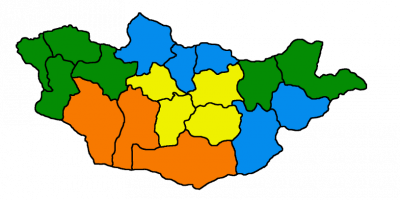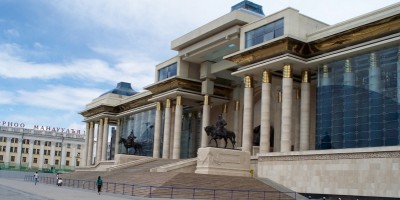Last night Deputy Speaker of Parliament S. Bayartsogt and Member of Parliament S. Ganbaatar had their much anticipated (at least by me) debate about the Oyu Tolgoi agreement. It turned out to be a surprisingly civil affair and an oddly pleasant display of democracy in action. Two opposing views being aired in public.
Mr. Ganbaatar, who was elected to parliament as an independent in the national elections last summer, has quickly made a name for himself as an ultra-skeptic of the Oyu Tolgoi agreement. His public criticism of the agreement has been continuous over that last few months, and he challenged Mr. Bayartsogt, who was the Minister of Finance when the agreement was signed, to debate him on national television about the agreement’s provisions earlier in the autumn. After two cancellations, they finally met on stage in the Mongolian National Broadcasting (MNB) studios.
The debate was moderated by an MNB newscaster and had a standard format with opening remarks, three minute points, and two minute counterpoints. The questions came from citizens calling in into the studio or through social media. My expectations were actually quite low. Mr. Ganbaatar has come across as brash in his interviews, and I cynically expected him to use the debate as a chance to make a political spectacle in a self-serving way. To my surprise, however, he actually came off as earnest and sincere.
He also came across as not fully understanding the complexity of a multi-billion dollar investment agreement, which compelled Mr. Bayartsogt to repeatedly begin his counterpoints with “Member Ganbaatar seems to misunderstand [topic X]…” Mr. Ganbaatar’s approach seemed to be that of a detective in search of a smoking gun. He knew a crime had been committed, he just needed to find the proof. The problem was that most of his smoking guns turned out to be misinterpretations of the facts.
For example, he presented a graph from a Rio Tinto presentation that showed Oyu Tolgoi’s impact on the government budget will peak over the next few years and then consistently diminish over time. Proof, Mr. Ganbaatar declared, that Rio Tinto itself anticipates a diminishing benefit to Mongolia from the project. Mr. Bayartsogt in his counterpoint explained that the interpretation was all wrong. The graph showed the relative impact–not absolute impact–so of course it diminishes over time because the overall budget will continue to grow as the economy grows. This for the most part became the dynamic between them with Mr. Ganbaatar presenting a new piece of damning evidence and Mr. Bayartsogt putting it to rest with a logical explanation.
The most telling point in the debate came when Mr. Ganbaatar expressed concern that Mongolia doesn’t have enough inspectors to ensure the agreement is being adhered to. He was voicing a concern that copper and gold from Oyu Tolgoi will exit the country without being properly accounted for. In other words, how can Mongolia ever know it’s not being ripped off? In the end, that is probably what the entire debate was about. Mr. Ganbaatar wanted someone to come on television and look into the camera and say “this is a good deal for Mongolia and we won’t be cheated.” Mr. Bayartsogt, for his part, did just that. He repeatedly explained why he thought it was a good deal.
Mr. Bayartsogt appeared to be the winner of the debate (of course, in my opinion). He seemed to have a very strong understanding of the provisions of the agreement and the reasoning behind many of the decisions made in developing it. He did have a tendency to get a bit lost in the weeds when explaining the details, so I wonder how many people in the viewing audience really understood what he was talking about. Nevertheless his knowledge of the issues came across as credible.
Only time will tell who was the ultimate winner of the debate or whether it swayed anyone’s opinions. (Full disclosure–I started and finished the debate holding similar opinions to Mr. Bayartsogt). The agreement and its impending impact is like nothing anyone in Mongolia has ever really experienced, and it is quite natural for people to be worried and skeptical and to demand answers. In Mr. Ganbaatar’s closing remarks he expressed a desire to see continued open debate on the agreement and decisions of implementation going forward. The simple fact that he expressed that desire in the kind of forum he did was encouraging.



